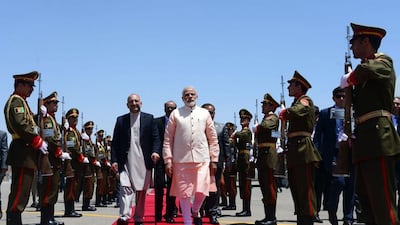HERAT, Afghanistan // Indian prime minister Narendra Modi and Afghan president Ashraf Ghani together opened a US$290 million hydroelectric dam on Saturday that will help irrigate thousands of hectares of farmland and stand as a symbol of the strengthening ties between the two countries.
Mr Modi and Mr Ghani together pressed a button to start the turbines at the dam as engineers released colourful balloons in celebration.
The Salma dam in western Herat, which borders Iran, will generate 42 megawatts, boosting Afghanistan’s power capacity by ten per cent and irrigating about 80,000 hectares of land.
Construction began in 1976 but was stalled for decades, first by the Soviet invasion of Afghanistan and then because of the civil war in the country.
“Afghans and Indians dreamt of this project in the 1970s,” Mr Modi said at the inauguration. “Today the brave Afghan people are sending a message that the forces of destruction, death, denial and domination shall not prevail.”
Mr Ghani dubbed the dam “the Afghanistan-India friendship dam”, and added: “We hope that this will lead to the development of many such projects.”
The Salma dam is one of the major projects into which India has poured more than $2 billion (Dh7.34bn) as part of a development partnership with Afghanistan since the Taliban was toppled from power in 2001.
Indian investment built the $90m parliament complex in Kabul and the two countries recently signed a three-way transit agreement with Iran to develop its southern port of Chabahar.
India is the fifth-largest donor to Afghanistan and a key supporter of the post-Taliban government in Kabul, which has led some analysts to sound warnings of India and Pakistan, its traditional rival, of waging war “by proxy” in Afghanistan.
Historically pro-Taliban, Pakistan has long been suspected of supporting the insurgents in Afghanistan and after years of official denial, the Pakistani government recently admitted that it has harboured the Taliban leadership inside the country.
A few days after Mr Modi’s visit to Kabul in December to open the new parliament, militants launched a 25-hour bomb and gun siege near the Indian consulate in the city of Mazar-i-Sharif. In March Taliban militants fired rockets at the parliament building.
But such incidents have not hampered the growth in Indian-Afghan relations. During the building of the dam, Indian engineers were flown into Kabul by helicopter every month and all materials and equipment were transported to the site through Iran, thus avoiding Pakistan.
The Chabahar deal, which will connect Iran, India and Afghanistan to central Asia, also bypassed Pakistan entirely.
Iranian president Hassan Rouhani admitted the deal was partly political.
“India is playing an important soft power role in Afghanistan given the security and geopolitics of the region,” said Omar Samad, former Afghan ambassador to Canada and France. “The vast majority of Afghans view India as a historically friendly country with limited security-related interests.”
* Agence France-Presse with Reuters and Bloomberg

